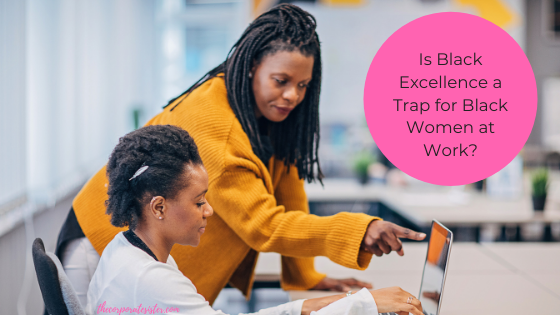In academics as well as the professional sphere, Black women have been conditioned to operate in excellence for the longest time. There is a badge of honor that comes with always showing up in your optimal capacity, especially if and when you’re the “only” Black woman in the room, the department, at this or that level, or in the company as a whole. The traditional saying according to which Black women have to work twice as hard to achieve the same, or lesser results, than their counterparts, has and still is, holding true for many Black women in the workplace…
However, with the advent of the COVID-19 pandemic and the racial reckoning that has accompanied it, it is a reality that is increasingly starting to fade out. As the glaring gender, race and class inequalities are rearing their ugly heads, inflamed by the repercussions of a global health crisis shaking the very foundations of our society, women in general, and Black women in particular are questioning the legitimacy and necessity of a narrative aimed at glorifying an ideal of excellence rarely rewarded in kind by the advancement, growth and progress it was always supposed to create.

Excellence, for the sake of it, is certainly a noble pursuit to aspire to. For many, Black Excellence has served as a tool of empowerment. However, unrecognized, demeaned and even questioned excellence drastically diminishes its intended impact and effects. The point of making it into once restricted rooms, once secret conversations, and into once segregated systems, is to birth opportunities for change, growth and progress. When these opportunities are stifled and compressed, status quo not only remains, it grows stronger by the sheer compounding effect of the unrecognized effort and the barriers in place. All in all, it becomes an even harsh reminder of the barriers still standing in the way of gender and race equity for all.
Is it then any surprise that most new small businesses started during the pandemic, were created by Black women? Is it a wonder that while the general unemployment rate sits at 4.8%, that of Black women towers over it at a whopping 6.2%
? How can this be when Black women are graduating at higher rates than their male counterparts, and entering the workforce in larger numbers? How can Black excellence result in such dismal representation at lower and higher levels of management alike?
These are just some of the questions at the tip of the Black Excellence iceberg that is prompting many a Black woman to divest from it, and even begin to embrace mediocrity, which for many Black women has long been associated with lack of opportunity. What was hailed as a protection against unfairness and bias, is increasingly being experienced and seen as too costly a badge of honor to carry. One that may unwittingly reduce the lives of those who strive for it, to exceptionalism that may not be necessarily fulfilling, rather than true meaning, purpose, and even sanity.
More and more, the question is being raised as to whether or not measuring Black women’s worth through what is traditionally being defined as “exceptionalism” is still valid? Is being a CEO or high-tech executive in a non-diverse environment the real definition of exceptional success, or one that needs to be re-visited to expand more inclusive definitions of what success may look like across gender and race spaces? Maybe true excellence is about fulfilling a career and life of meaning on our own terms, inclusive of our different identities and aspirations, making it a welcoming space of growth rather than an enclosed trap of traditional expectations…
The Corporate Sister







